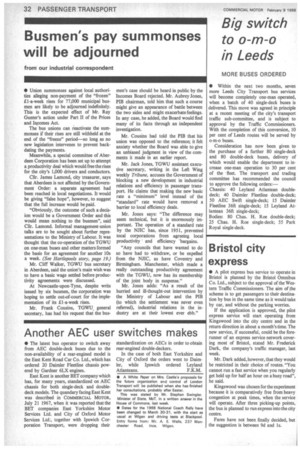Busmen's pay summonses will be adjourned
Page 34

If you've noticed an error in this article please click here to report it so we can fix it.
from our industrial correspondent • Union summonses against local authorities alleging non-payment of the "frozen" £1-a-week rises for 77,000 municipal busmen are likely to be adjourned indefinitely. This is the expected effect of Mr. Ray Gunter's action under Part II of the Prices and Incomes Act.
The bus unions can reactivate the summonses if their rises are still withheld at the end of the "freeze" period so long as no new legislation intervenes to prevent backdating the payments.
Meanwhile, a special committee of Aberdeen Corporation has been set up to attempt a productivity deal which would free the rises for the city's 1,000 drivers and conductors.
Cllr. James Lamond, city treasurer, says that Aberdeen is not affected by the Government Order: a separate agreement had been reached in local negotiations. It would be giving "false hope", however, to suggest that the full increase would be paid.
"Obviously, the outcome of such a decision would be a Government Order and this would mean nothing to the busmen", said Cllr. Lamond. Informal management-union talks are to be sought about further representations to the Ministry of Labour. It was thought that the co-operation of the TGWU on one-man buses and other matters formed the basis for an agreement for another 1 Os a week. (See Hartlepools story, page 19.) Mr. Cliff Walker, TGWU bus secretary in Aberdeen, said the union's main wish was to have a basic wage settled before productivity agreements were discussed.
At Newcastle-upon-Tyne, despite writs issued by six busmen, the corporation was hoping to settle out,of-court for the implementation of its £1-a-week rises.
Mr. Frank Cousins, TGWU. general secretary, has had his request that the bus men's case should be heard in public by the Incomes Board rejected. Mr. Aubrey Jones, PIB chairman, told him that such a course might give an appearance of battle between the two sides and might exacerbate feelings. In any case, he added, the Board would find many of its facts through an independent investigation.
Mr. Cousins had told the P18 that his union was opposed to the reference; it felt anxiety whether the Board was able to give an unbiased judgment in view of the comments it made in an earlier report.
Mr. Jack Jones, TGWU assistant executive secretary, writing in the Left Wing weekly Tribune, accuses the Government of blocking a new development in industrial relations and efficiency in passenger transport. He claims that making the new basic rate a "minimum" level instead of the "standard" rate would have removed a barrier to local efficiency deals.
Mr. Jones says: "The difference may seem technical, but it is enormously important. The operation of a standard rate by the NJIC has, since 1951, prevented local corporations from agreeing local productivity' and efficiency bargains.
"Any councils that have wanted to do so have had to withdraw, or be expelled from the NJIC, as have Coventry and Birmingham. Manchester, which made a really outstanding productivity agreement with the TGWU, now has its membership of the joint body in suspense."
Mr. Jones adds: "As a result of the hurried and ill-thought-out intervention by the Ministry of Labour and the PIB (to which the settlement was never even referred), industrial relations in the industry are at their lowest ever ebb."




































































































